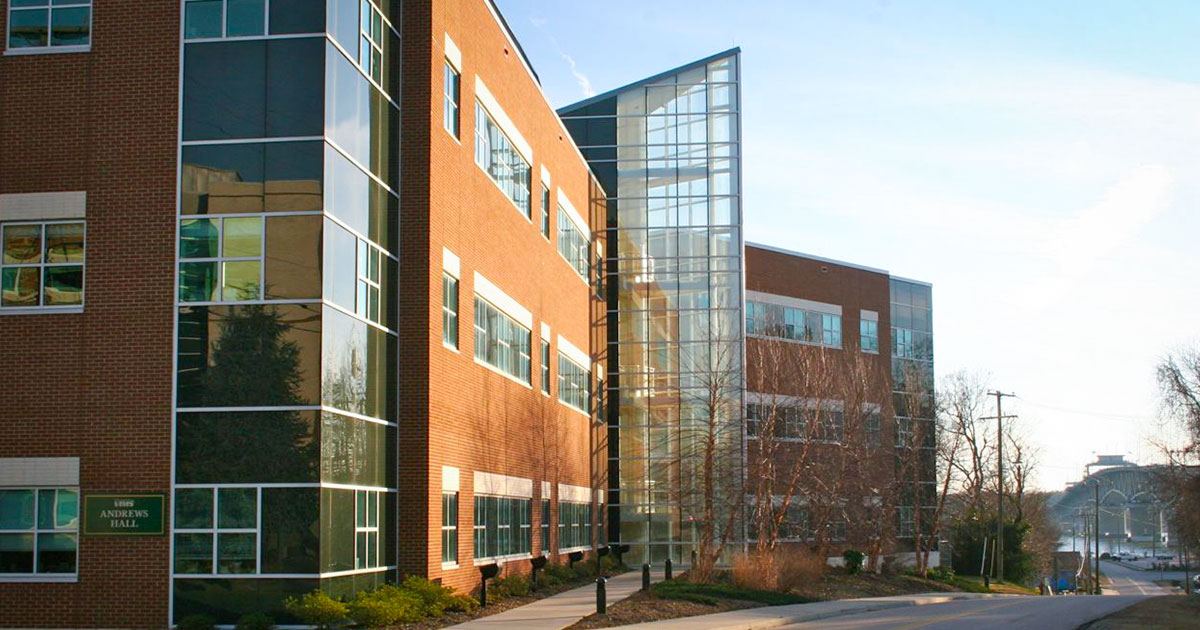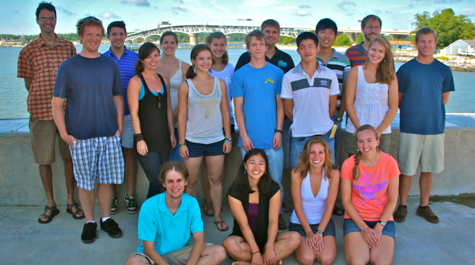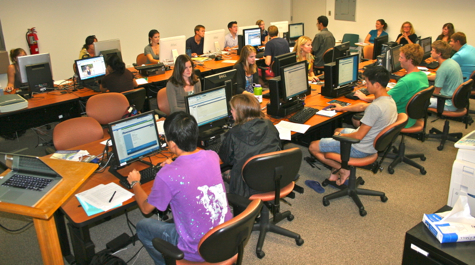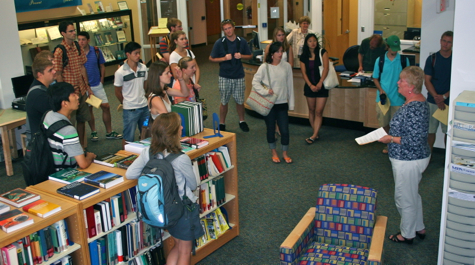VIMS welcomes incoming class of 2012
Twenty new graduate students excel both in science and other pursuits
The Virginia Institute of Marine Science welcomes 20 new graduate students to its Gloucester Point campus this week, bringing total enrollment in the College of William and Mary’s School of Marine Science at VIMS to 110 students.
VIMS Dean and Director John Wells says the quality of this year’s class continues “a long-standing tradition of excellence in scholarship and research among our matriculating students.”
Professor Linda Schaffner, VIMS’ Associate Dean of Academic Studies, says “The depth and breadth of our students’ experiences is truly astonishing, not only in scientific research, but in areas like athletics and community service. They’re an extremely talented and well-rounded group that will contribute great things to VIMS, the local community, and our knowledge of Chesapeake Bay and the global ocean.”
One incoming student, Kristen Omori, was a Pac-12 gymnast who has tagged sockeye salmon in Alaska and studied the effects of dam removal in the Pacific Northwest. Another, Randy Jones, has sailed as an assistant scientist with the study-abroad program "Sea Semester," with voyages in both the Atlantic and Pacific oceans. Lisa Ailloud, fluent in French, has studied sharks at NOAA’s Panama City Laboratory in Florida and sustainable-seafood practices at the New England Aquarium. Michael Kuschner is an Olympic hopeful in 49er-class sailing, and a winner of a student presentation award from the American Chemical Society.
Continuing Students
Three of the students—Kelsey Fall, Julia Moriarty, and CJ
Sweetman—are entering the doctoral program after having completed or bypassed their
Master’s degree at VIMS. Fall will continue her study of the erosion and
accumulation of muddy sediments in Chesapeake Bay, processes that impact the Bay’s
water quality and marine life. 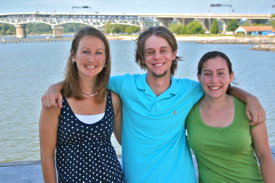 Moriarty will extend her work on a computer
model designed to study flood deposits in New Zealand as part of the National Science
Foundation’s Source-to-Sink program. Sweetman’s Master’s research, part of an
international study of the Mid-Atlantic Ridge, has led to two publications in Deep-Sea Research II. He has also contributed
to monitoring the environmental effects of the Deepwater Horizon oil spill and
to the VIMS Shark Survey.
Moriarty will extend her work on a computer
model designed to study flood deposits in New Zealand as part of the National Science
Foundation’s Source-to-Sink program. Sweetman’s Master’s research, part of an
international study of the Mid-Atlantic Ridge, has led to two publications in Deep-Sea Research II. He has also contributed
to monitoring the environmental effects of the Deepwater Horizon oil spill and
to the VIMS Shark Survey.
Journal Authors
Several of the students already have earned authorship on research articles in respected journals, including Sweetman’s contributions to Deep-Sea Research II and a paper by Omori in Ecology. Eric Miller, who arrives at VIMS from Texas A&M University, has contributed to publications in three different journals: Environmental Science & Technology, Geochimica et Cosmochimica Acta, and Marine Chemistry. His ES&T paper looks at the movement of radioactive iodine through soils at the Savannah River Site, a former nuclear-processing facility for the Department of Energy. Alison O’Connor arrives from Oberlin College with two publications in ES&T, both reporting on studies of isoprene aerosols, byproducts of fossil-fuel combustion that have an important effect on air quality and climate. She comes to VIMS with a prestigious Graduate Research Fellowship from the National Science Foundation, as well as a passion for tap dancing.
In addition to their research backgrounds, several incoming students bring experience in environmental policy and education. Emily Eggington embarks at VIMS after two years as a Program, Community, and Government Affairs Associate with the Metropolitan Waterfront Alliance, a network of more than 600 organizations dedicated to restoring the once pristine waters of New York and New Jersey Harbor. Ike Irby arrives after three years as an 11th-grade physics and earth science teacher at the John Burroughs School in St. Louis. He should have no trouble facing the obstacles of graduate school, having run the 110- and 400-meter hurdles as an undergraduate double major in earth science and physics student at Bowdoin College.
International Students
The incoming class also features two international students, Zhou Liu and Jiabi Du. Liu comes to VIMS from Xiamen University in Xiamen, China, where he used his expertise in underwater acoustics to study how human-generated noise might affect endangered Chinese spotted seals in Dalian National Nature Reserve. Du arrives from Nanjing University with a background in using acoustic Doppler current profilers and other high-tech instruments to study and model sediment transfer in the Yellow Sea and Yalu River estuary. Liu and Du join 12 other international students at VIMS, a group that makes up 11% of the overall student population.
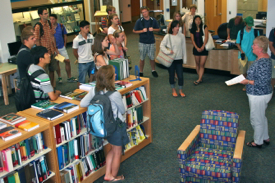 A further statistical snapshot of the incoming class shows
that 80% of the students (16 of 20) will be pursuing Master’s degrees, with the
remaining 20% working toward the Ph.D. Sixteen of the students arrive at
Gloucester Point from out-of-state, while four are from Virginia and two are
from overseas. The class is evenly split between males and females. A total of
120 students applied for admission, a 17.6% increase in applications from the
previous year.
A further statistical snapshot of the incoming class shows
that 80% of the students (16 of 20) will be pursuing Master’s degrees, with the
remaining 20% working toward the Ph.D. Sixteen of the students arrive at
Gloucester Point from out-of-state, while four are from Virginia and two are
from overseas. The class is evenly split between males and females. A total of
120 students applied for admission, a 17.6% increase in applications from the
previous year.
The School of Marine Science at VIMS
The School of Marine Science at VIMS is one of five graduate schools of the College of William and Mary. It awarded its first Masters degree in 1943 and inaugurated a Doctoral program in 1964. Nearly 900 marine scientists have now earned graduate degrees through the program. Graduate studies and research opportunities are offered in marine science, oceanography, fisheries, and marine policy.
VIMS has an enviable record of producing graduates who take on leading roles in academia, government, and industry. VIMS grads head up the University of Maryland Center of Environmental Science, the Virginia Seafood Council, the Southeast Fisheries Science Center, one of the leading environmental consulting and engineering firms in the northeastern U.S., and the Smithsonian’s new Ocean Hall, among many other leadership positions.
